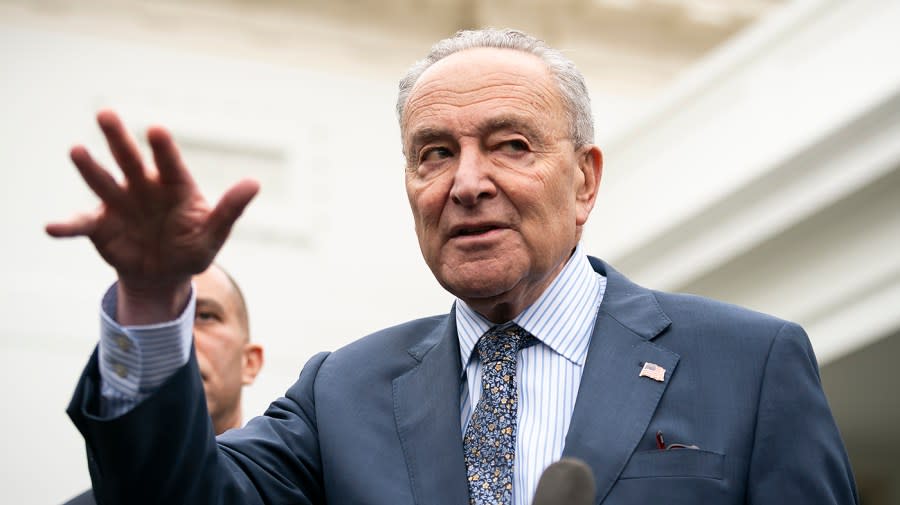Senate advances $460B spending package to avert government shutdown

The Senate voted on Friday to advance a $460 billion package of six spending bills to fund an array of federal departments ahead of a partial government shutdown deadline at midnight.
The 63-35 vote to advance the legislation sets up a vote on final passage sometime later Friday or possibly Saturday.
“We’re not going to allow the government to shut down,” Senate Republican Leader Mitch McConnell (Ky.) vowed to reporters last month.
McConnell voted Friday to advance the bill but the two Republicans vying to replace him as Senate GOP leader — Senate Republican Whip John Thune (S.D.) and Sen. John Cornyn (R-Texas) voted against moving it forward.
Thune and Cornyn are jockeying for the support of conservatives who wanted to block it in order to gain leverage to force votes on several border- and immigration-related amendments, such as a proposal sponsored by Sen. Bill Hagerty (R-Tenn.) to require the census to count the number of non-citizens and illegal aliens.
Fourteen Republican senators voted to advance the legislation while one Democrat voted no.
The legislation, which passed the House 339-85, is in line with the spending caps deal reached between former Speaker Kevin McCarthy (R-Calif.), Senate Majority Leader Chuck Schumer (D-N.Y.) and President Biden last year.
Speaker Mike Johnson (R-La.) and Schumer reaffirmed the spending deal, which sets a $1.65 trillion spending top line and includes $69 billion in adjustments that were part of a “side deal” to raise the federal debt limit in 2023.
The package would fund military construction, water development and the departments of Veterans Affairs, Agriculture, Commerce, Justice, Energy, Interior, Transportation, and Housing and Urban Development.
The 1,050-page legislation ran into staunch opposition from Senate conservatives led by Sens. Rick Scott (Fla.), Mike Lee (Utah) and Rand Paul (Ky.), who complained about more than 6,000 earmarks in the bill totaling more than $12 billion in spending.
Scott demanded a vote on an amendment to recommit the bill to the Senate Appropriations Committee to strip all the earmarks out of it.
But that action would have delayed the legislation beyond the March 8 deadline and likely would have resulted in a partial shutdown.
Conservative critics of the bill could still stage a filibuster on the floor to delay it until Saturday to protest the earmarks and lack of policy riders addressing border security and their other political priorities.
Senate Appropriations Committee Chair Patty Murray (D-Wash.) pleaded with her colleagues not to hold up the bill beyond the midnight deadline.
“We all know the deadline. We are here in the Senate ready to move quickly in order to avoid a senseless shutdown,” she said.
Sen. Susan Collins (R-Maine), the vice chair of the Appropriations panel, warned: “If we do not act, at midnight tonight, we will have a partial government shutdown.”
“I would urge my colleagues to stop playing with fire,” she said, pushing back against conservative colleagues who are threatening to delay the package to vent frustration over their inability to amend it.
Democrats touted a number of “key wins” such as full funding for the Special Supplemental Nutrition Program for Women, Infants and Children, known as WIC, which benefits 7 million women and children nationwide.
They also pointed to funding for hiring new air traffic controllers, rail safety inspectors and a rejection of proposed cuts to environmental and conservation programs.
Republicans also got several policy wins in the package, such as an amendment sponsored by Sen. John Kennedy (R-La.) to prevent the Department of Veterans Affairs from flagging veterans who need help managing their financial affairs to the FBI’s National Instant Criminal Background Check System and preventing them from buying firearms.
Sen. Chris Murphy (D-Conn.), the Senate’s leading gun control advocate, announced this week he would oppose the bill because of the “terrible new gun policy rider that significantly rolls back the firearms background check system.”
Appropriators acknowledged they had to cut popular programs because of the stricter spending caps pushed by House Republicans.
“It was a really, really, really hard budget. Nobody’s going to like our Interior budget because we had to cut, we had to cut a lot,” said Sen. Lisa Murkowski (R-Alaska), the ranking member on the Interior Appropriations Subcommittee.
Friday’s vote represents a significant accomplishment for Senate leaders and the chair and ranking member of the Senate Appropriations Committee, Murray and Collins, as it moves half of the annual funding bills closer to the finish line.
Once the current set of funding bills reaches Biden’s desk, senators will focus on passing the remaining six appropriations bills funding the Departments of Defense, Labor, Health and Human Services, Homeland Security and other priorities by March 22.
Lawmakers regard the second tranche of funding bills as more difficult to pass and conservatives are looking to attach policy riders to block the Pentagon from reimbursing the travel costs of service members who obtain abortions and to zero out Secretary of Homeland Security Alejandro Mayorkas’s salary.
Congress has had to pass a series of short-term funding bills to continually postpone the funding deadlines since fiscal year 2024 began on Oct. 1.
Schumer and Johnson initially set deadlines of Jan. 19 and Feb. 2 to pass the two tranches of funding bills. Those dates were later postponed to March 1 and March 8 and then pushed back again to March 8 and March 22.
Schumer, McConnell and House Democratic Leader Hakeem Jeffries (N.Y.) pressed Johnson at a White House meeting last week to work with them to avoid a shutdown.
“We made it so clear that we can’t have the shutdown because it hurts so many people in so many different ways,” Schumer told reporters after the Feb. 27 meeting, which Biden and Vice President Kamala Harris also attended.
For the latest news, weather, sports, and streaming video, head to The Hill.


